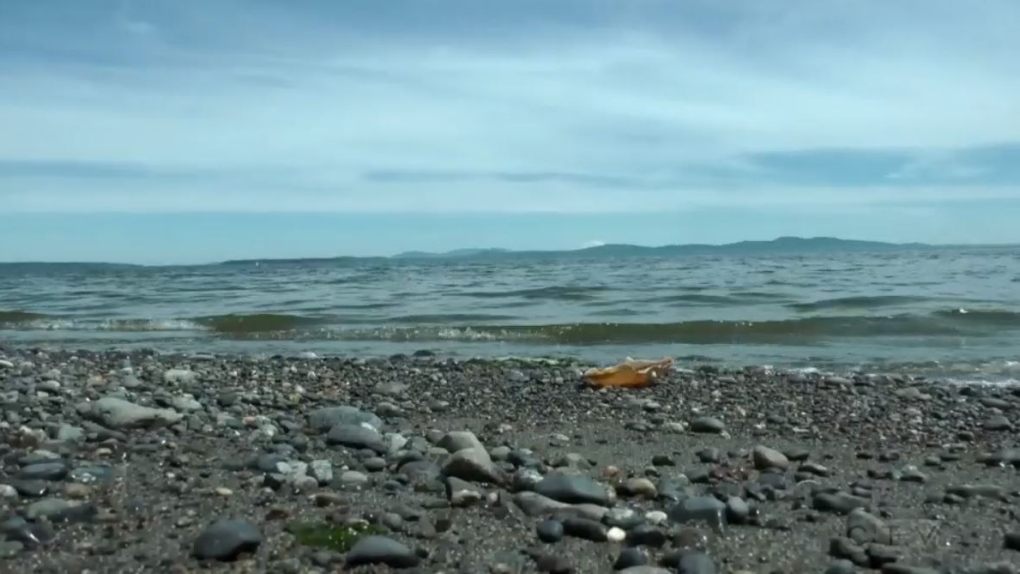Massive earthquake in B.C. could trigger larger tsunami than expected: study
A new study is questioning whether current scientific models are underestimating the potential size of tsunamis off British Columbia's coast in the event of a large-scale earthquake.
Earthquake scientist John Cassidy says that an ocean plate off the B.C. coast is moving a few centimetres towards Vancouver Island each year, and when that happens sediment builds up.
"If you think of a bulldozer driving through the sand or through some soil, it sort of pushes everything forward and it stacks stuff up," he said. "[That's] exactly the same thing as the ocean plate."
The study published in the journal Earth Science Reviews looks at how that sediment would affect earthquakes in subduction zones around the world.
CASCADIA SUBDUCTION ZONE
Southern B.C. is located on the Cascadia Subduction Zone, which spans from northern Vancouver Island down to northern California.
"What this study is saying is that not only will the tsunami be generated by the movement of the fault, but also potentially the movement of the faults in the sediment that’s been scraped off over the years," said Kate Moran, CEO of Ocean Networks Canada.
"And so really, there could be higher waves generated in various locations on the planet," she said.
 A beach is pictured on Vancouver Island, B.C. (CTV News)
A beach is pictured on Vancouver Island, B.C. (CTV News)
Local experts say that while the study is an important reminder of tsunami risks, researchers here are unlikely to change their current predictions.
"It's not something we would change our models or risk estimates at this time because it’s one piece of a very complicated puzzle," said Cassidy.
Still, the earthquake scientist says all information about how to accurately predict what to expect from tsunamis can help protect people and property.
CTVNews.ca Top Stories

W5 Investigates 'I never took part in beheadings': Canadian ISIS sniper has warning about future of terror group
An admitted Canadian ISIS sniper held in one of northeast Syria’s highest-security prisons has issued a stark warning about the potential resurgence of the terror group.
'Absolutely been a success': Responders looks back at 988, Canada's Suicide Crisis Helpline, one year later
In its first year, responders for Canada's Suicide Crisis Helpline, known as 988, have answered more than 300,000 calls and texts in communities nationwide.
Prime Minister Trudeau meets Donald Trump at Mar-a-Lago
Prime Minister Justin Trudeau landed in West Palm Beach, Fla., on Friday evening to meet with U.S.-president elect Donald Trump at Mar-a-Lago, sources confirm to CTV News.
Nova Scotia PC win linked to overall Liberal unpopularity: political scientist
Nova Scotia Premier Tim Houston is celebrating his second consecutive majority mandate after winning the 2024 provincial election with 43 seats, up from 34. According to political science professor Jeff MacLeod, it's not difficult to figure out what has happened to Liberals, not just in Nova Scotia but in other parts of Canada.
'Mayday! Mayday! Mayday!': Details emerge in Boeing 737 incident at Montreal airport
New details suggest that there were communication issues between the pilots of a charter flight and the control tower at Montreal's Mirabel airport when a Boeing 737 made an emergency landing on Wednesday.
Hit man offered $100,000 to kill Montreal crime reporter covering his trial
Political leaders and press freedom groups on Friday were left shell-shocked after Montreal news outlet La Presse revealed that a hit man had offered $100,000 to have one of its crime reporters assassinated.
Questrade lays off undisclosed number of employees
Questrade Financial Group Inc. says it has laid off an undisclosed number of employees to better fit its business strategy.
Cucumbers sold in Ontario, other provinces recalled over possible salmonella contamination
A U.S. company is recalling cucumbers sold in Ontario and other Canadian provinces due to possible salmonella contamination.
Billboard apologizes to Taylor Swift for video snafu
Billboard put together a video of some of Swift's achievements and used a clip from Kanye West's music video for the song 'Famous.'

































